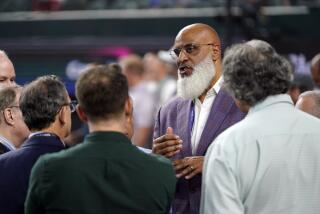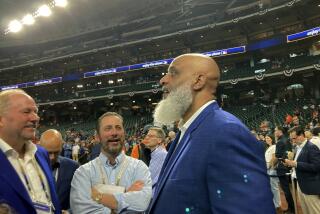Baseball Lockout Deemed Unlikely : Negotiations: Owners’ representative reopens bargaining by saying he will recommend against hostile threats.
- Share via
The possibility of a lockout by major league owners that would delay or interrupt spring training or the baseball season seemed to evaporate Wednesday.
Richard Ravitch, president of the owners’ Player Relations Committee, began the reopened labor talks in New York by telling representatives of the Major League Players Assn. he would recommend to the owners that there be no lockout in 1993.
“Our best chance to implement a new compensation system for 1994 is to negotiate without hostile threats or any artificial, short-term deadline,” Ravitch said later, adding that he expects the owners to support his recommendation and that if there were a work stoppage in ‘93, it would be the result of a players’ strike.
Don Fehr, executive director of the players’ union, said he considered the no-lockout stance constructive and thought there was weight to it because Ravitch has been given enough independence and authority by the owners to get what he wants.
Ravitch reiterated Wednesday that what he and the owners want in the reopened negotiations is a revenue-sharing system that includes a salary cap.
Citing the possibility of declining revenue from attendance and the next national TV contract, Ravitch said the “number one objective is to know what it will cost to play as expressed by a percentage of gross revenue (designated for player salaries).”
Ravitch did not discuss specific details with the union at Wednesday’s first session but did raise what could be the first stumbling block.
While the reopener allows the clubs to renegotiate compensation and free agency, the current bargaining agreement does not officially expire until Dec. 31. Ravitch asked that the expiration date be moved to Nov. 1 so that 1994 contracts and next winter’s free agency be governed by the new system, assuming there will be a new system.
The union might be unwilling to agree to the change in dates because of the impact on ’94 contracts and the possibility of major revisions in free agency under a new system. Fehr said he would have a response at the next meeting, in a week to 10 days. On the concept of revenue sharing, Fehr reiterated that the union would not agree to any partnership in which it does not have a vote and voice in how revenue is generated and that the clubs should consider sharing more of their revenue before asking the players to help create a system that will lower salaries.
Fehr also retains the right to strike in late season, jeopardizing the postseason portion of the $401 million that the clubs are scheduled to receive in this last year of the current TV package.
That $401 million is one reason the clubs will not stage a lockout this year, when the debuts of the two expansion teams and the widespread feeling that a new system cannot be negotiated under the pressure of short-term deadlines also mitigate against it.
More to Read
Go beyond the scoreboard
Get the latest on L.A.'s teams in the daily Sports Report newsletter.
You may occasionally receive promotional content from the Los Angeles Times.










